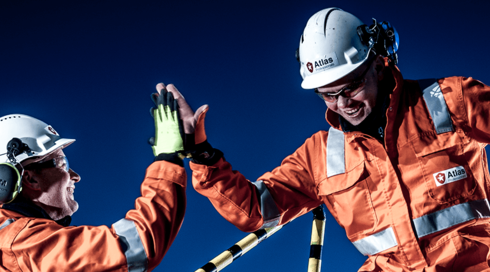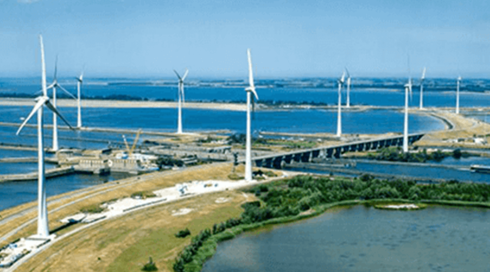4
As The Ocean Cleanup continues its mission removing floating ocean plastic – we got behind the scenes to speak to Henk van Dalen, Director Ocean, and Atlas Professional Don Kemler, Senior Operations Manager, to fathom the depth of this endeavour.
The work which The Ocean Cleanup performs scarcely needs an introduction, their name says it all. They are on a mission to clean up 90 per cent of floating plastic pollution in our oceans. Sounds like a mammoth task, considering every year millions of tons of plastic enters the oceans. And it is. They are currently tackling this issue with a two-pronged approach. It includes harvesting plastic in the Great Pacific Garbage Patch with the help of System 002 – an active propelled capturing system, creating an artificial coastline to collect plastic waste from this accumulation zone. Simultaneously, The Ocean Cleanup is preventing plastic from entering the oceans from rivers by intercepting it at the source. The organisation, driven by its shared passion to make an impact, has evolved since its inception to become a more project-focused, research backed institute shares Henk van Dalen, Director Ocean. “Every step we take has been a great learning curve. As we are constantly testing and improving, the R&D aspect has become more predictable because you become more experienced and knowledgeable about the work you’re doing. If you translate all those tests into learnings and thorough risk assessments, what we get into is a process where we are reducing quite a bit of risk before we take the big step out onto the open ocean,” shares Henk. He joined the non-profit organisation to use his years of offshore expertise in combination with his passion to preserve the beauties of the ocean and his desire to surf cleaner waves.
Execution in the sea, help onboard
Solving a problem this massive in size means roping in partners globally. Henk believes that having industry expertise and support has been beneficial for their uninterrupted run. “We work closely with offshore companies and get their expertise into the project. It is all about building and leveraging each other’s capabilities. For the operational side of things, we do need skilled people with a maritime and offshore background,” he shares. So, when Atlas approached Henk to lend a helping hand, the group was happy to have someone take note of their blind spots and support them. “As a team, we always try to plan for the best, but there are always these moments when difficulties arise, and one didn’t see it coming. Atlas has been a lifesaver, providing hands-on support with qualified personnel. They have been quick on the ball and have been thinking with us about the kind of professionals we require and finding ways to address our needs,” Henk says.
Navigating deep waters together
Leading the vessels and acting as a liaison between the onshore and offshore team is Don Kemler. Atlas recently connected Don with The Ocean Cleanup, and since then Don has been working as a Senior Operations Manager with the non-profit organisation. Keen to be using his years of offshore experience for making the world a better place, he says, “I’m now involved in something bigger than myself. Cleaning up the oceans and making it better for everybody’s children. There is a level of dedication involved in this. When you see tonnes of plastic scooped out of the ocean and know that you have had a role to play, it makes the job worthwhile. For me, it was a life-changing career move, and I’m glad Atlas supported me with this role, and I took the plunge. This is a perfect opportunity for me to expand my horizons and test my potential too.”
Small drops in the ocean
From a refrigerator to a mannequin doll, The Ocean Cleanup team has seen it all come out of the Great Pacific Garbage Patch. It contains about 100 million kilograms of plastic, and the team’s offshore trips are always a worryingly cheerful experience. It’s intense, explains Henk, “When you see the system unload on the deck after a round of harvest, you notice the pile of trash in comparison to a human, it’s overwhelming. Also worrying that this was the result of only a week of towing a relatively small system through the waters there,” he says. Don agrees, “Everyone is doing everything they can to make this project work. When we can see it happen right before our eyes, it’s an exciting time, and emotions are flying everywhere. We love it.” For the coming years, The Ocean Cleanup wants to progressively double their fleet size until they have about eight to ten systems, “Although much is still uncertain, we hope to achieve that in 2025, and then we should be cleaning up the whole garbage patch,” Henk says.
.png)
.png)


